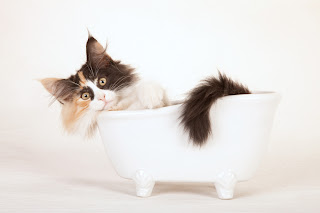 For humans, grooming is a daily process. We scrub our hands,
wash our faces and take frequent showers to keep ourselves clean. Although many
pets, especially cats, are known for their ability to clean themselves, professional
grooming for dogs and cats is essential to helping them stay squeaky clean. Grooming
is about much more than just making your pet look pretty; it can also help
prevent unpleasant issues from arising with their hygiene and health.
For humans, grooming is a daily process. We scrub our hands,
wash our faces and take frequent showers to keep ourselves clean. Although many
pets, especially cats, are known for their ability to clean themselves, professional
grooming for dogs and cats is essential to helping them stay squeaky clean. Grooming
is about much more than just making your pet look pretty; it can also help
prevent unpleasant issues from arising with their hygiene and health.
This is especially true with long-haired pets. While a dog
or cat with long, luxurious fur can be beautiful, it also requires a lot of
maintenance. In the December/January 2014 issue of Animal Wellness Magazine, an article on grooming by professional groomer Toni Brightman explained
the pain and potential illness associated with pets whose hair gets tangled and
matted.
“If you’re a woman, imagine hot rollers wound too tightly to
your head,” Brightman wrote, explaining how a matted fur coat feels to your
pet. The twists and tangles in their fur are much more than unpleasant to the
eye; they could actually be hampering circulation, causing skin sores and
infections or hiding other ailments.
Does this mean that if you have a short-haired dog or cat,
you are free to let them groom themselves? Actually, there are many additional
benefits to a professional groom that will help pets of all sizes and coat
types:
Hygiene – keeping
an animal’s back-end clean and mat-free is important to allow them to eliminate
properly.
Eyes – tearing of
the eyes can lead to residue build up on your pet’s face, which can pull at
their
fur and become gummy and difficult to clean. Regular grooming can prevent this buildup.
fur and become gummy and difficult to clean. Regular grooming can prevent this buildup.
Nails – Nail care
is essential for any pet, even cats who may have a scratching post or other
means of filing their claws. If nails grow too long, they can actually curl and
begin to grow into the pads of your pet’s feet. This is extremely painful and
can cause strain on joins.
Feet – Mats of
fur can grow hard and become tangled and between your pet’s pads. Imagine
pebbles stuck between your toes! A groomer will keep this hair short and clean.
Ears – Ear
cleaning in many breeds also requires trimming the hair that can grow inside
the ear canal. A regular groom will include maintenance of this fur to prevent
overgrowth and infections.
Long hair or short, cat or dog, a clean and well-groomed
coat will help you pet stay healthy and happy. At Morris Animal Inn, a day at
our Grooming Salon and Spa means relaxation and attention from our experienced
staff. Your pet will come home looking and feeling their best! Watch the video
below for a taste of what your dog or cat can expect from a grooming
appointment at Morris Animal Inn:





